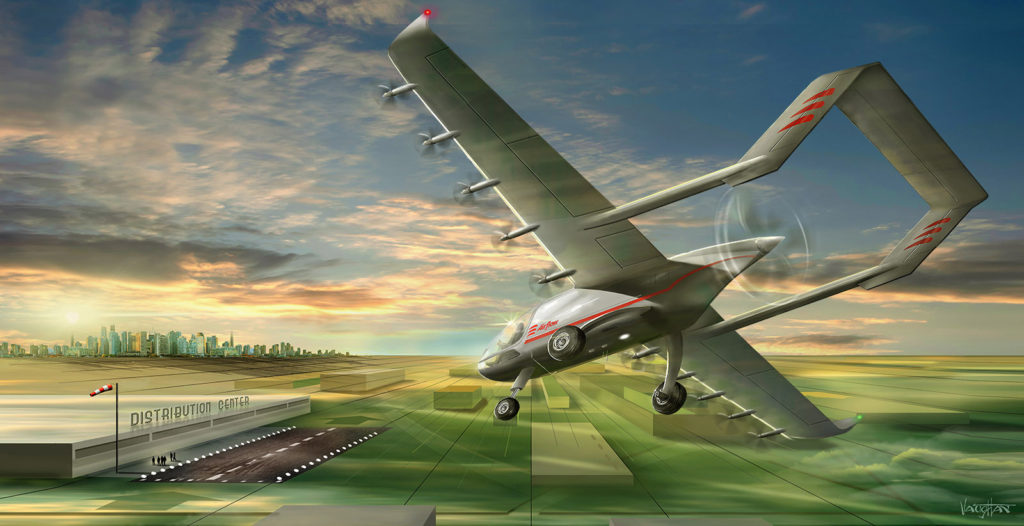Chuyển sang chế độ ngoại tuyến với ứng dụng Player FM !
Podcast Ep. #44 – Airflow is Building an eSTOL Aircraft for Middle-Mile Logistics
Manage episode 277868532 series 1757905
 Marc Ausman is the co-founder and CEO of Airflow, a California-based startup that is building an electric short-haul cargo aircraft. Marc holds a commercial pilot license, and among other endeavours, was previously the Chief Strategist for Airbus’ all-electric, tilt-wing vehicle demonstrator known as Vahana. Alongside four other former Vahana team members, Marc and the team at Airflow are building an aerial logistics network to move short-haul cargo quickly and cost effectively by using unused airspace around cities.
Marc Ausman is the co-founder and CEO of Airflow, a California-based startup that is building an electric short-haul cargo aircraft. Marc holds a commercial pilot license, and among other endeavours, was previously the Chief Strategist for Airbus’ all-electric, tilt-wing vehicle demonstrator known as Vahana. Alongside four other former Vahana team members, Marc and the team at Airflow are building an aerial logistics network to move short-haul cargo quickly and cost effectively by using unused airspace around cities.
Key to Airflow’s vision is electric short takeoff and landing (eSTOL). Airflow’s eSTOL aircraft require only a few hundred feet for takeoff and landing—about the length of a football field—which means that runways can be built almost anywhere, even under existing regulations. What is more, even larger rooftops that can fit more than three conventional helipads could feasibly be used as a runway. Given the aerodynamic efficiency advantages of fixed-wing aircraft over rotary vertical take-off and landing (VTOL) aircraft, Airflow have come-up with an interesting alternative concept to many other companies in the growing urban mobility sector.
So in this episode of the Aerospace Engineering Podcast, Marc and I talk about:
- Airflow’s vision of building the urban logistics network of the future
- some of the misconceptions of eSTOL and eVTOL
- the advantages of electric powertrains beyond reducing emissions
- the technology Airflow is developing and challenges that need to be overcome
- and striking a balance between financial and engineering incentives
This episode of the Aerospace Engineering Podcast is brought to you by my patrons on Patreon. Patreon is a way for me to receive regular donations from listeners whenever I release a new episode, and with the help of these generous donors I have been able to pay for much of the expenses, hosting and travels costs that accrue in the production of this podcast. If you would like to support the podcast as a patron, then head over to my Patreon page. There are multiple levels of support, but anything from $1 an episode is highly appreciated. Thank you for your support!
Selected Links from the Episode
50 tập
Manage episode 277868532 series 1757905
 Marc Ausman is the co-founder and CEO of Airflow, a California-based startup that is building an electric short-haul cargo aircraft. Marc holds a commercial pilot license, and among other endeavours, was previously the Chief Strategist for Airbus’ all-electric, tilt-wing vehicle demonstrator known as Vahana. Alongside four other former Vahana team members, Marc and the team at Airflow are building an aerial logistics network to move short-haul cargo quickly and cost effectively by using unused airspace around cities.
Marc Ausman is the co-founder and CEO of Airflow, a California-based startup that is building an electric short-haul cargo aircraft. Marc holds a commercial pilot license, and among other endeavours, was previously the Chief Strategist for Airbus’ all-electric, tilt-wing vehicle demonstrator known as Vahana. Alongside four other former Vahana team members, Marc and the team at Airflow are building an aerial logistics network to move short-haul cargo quickly and cost effectively by using unused airspace around cities.
Key to Airflow’s vision is electric short takeoff and landing (eSTOL). Airflow’s eSTOL aircraft require only a few hundred feet for takeoff and landing—about the length of a football field—which means that runways can be built almost anywhere, even under existing regulations. What is more, even larger rooftops that can fit more than three conventional helipads could feasibly be used as a runway. Given the aerodynamic efficiency advantages of fixed-wing aircraft over rotary vertical take-off and landing (VTOL) aircraft, Airflow have come-up with an interesting alternative concept to many other companies in the growing urban mobility sector.
So in this episode of the Aerospace Engineering Podcast, Marc and I talk about:
- Airflow’s vision of building the urban logistics network of the future
- some of the misconceptions of eSTOL and eVTOL
- the advantages of electric powertrains beyond reducing emissions
- the technology Airflow is developing and challenges that need to be overcome
- and striking a balance between financial and engineering incentives
This episode of the Aerospace Engineering Podcast is brought to you by my patrons on Patreon. Patreon is a way for me to receive regular donations from listeners whenever I release a new episode, and with the help of these generous donors I have been able to pay for much of the expenses, hosting and travels costs that accrue in the production of this podcast. If you would like to support the podcast as a patron, then head over to my Patreon page. There are multiple levels of support, but anything from $1 an episode is highly appreciated. Thank you for your support!
Selected Links from the Episode
50 tập
Όλα τα επεισόδια
×Chào mừng bạn đến với Player FM!
Player FM đang quét trang web để tìm các podcast chất lượng cao cho bạn thưởng thức ngay bây giờ. Đây là ứng dụng podcast tốt nhất và hoạt động trên Android, iPhone và web. Đăng ký để đồng bộ các theo dõi trên tất cả thiết bị.




